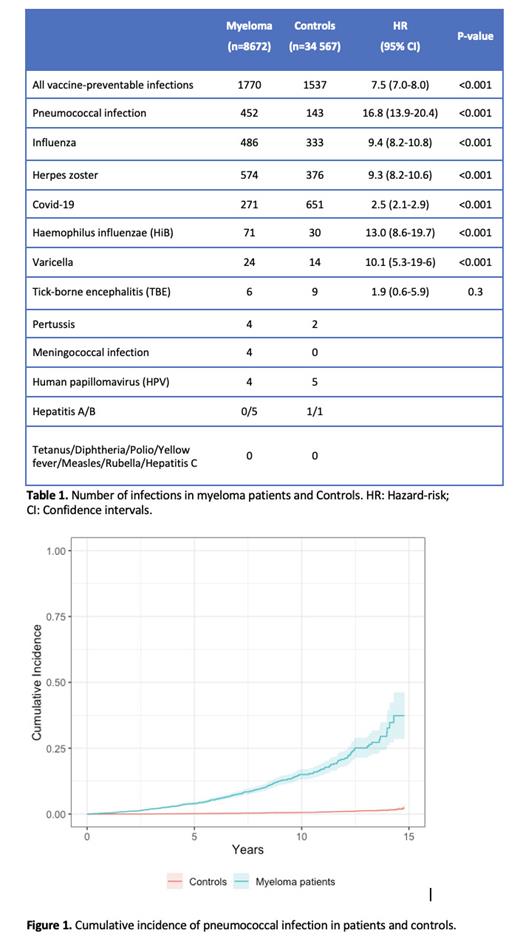Background: Infections are a major clinical problem in the management of multiple myeloma (MM) due to both disease and treatment related factors. Measures to prevent infection, such as vaccination, are therefore of paramount importance in the clinical care of MM patients. Data on vaccine-preventable infections in MM treated with modern therapy is sparse.
Aim: To estimate the risk of vaccine-preventable infections in myeloma patients compared to a healthy population using real-world data.
Methods: The study population included all patients with symptomatic MM diagnosed between 2008 and 2021 and included in the Swedish Myeloma Registry (n=8,672). Four controls per MM patient were identified randomly from the Swedish population database matched for age, sex and county of residence (n=34,567). Diagnoses of infectious diseases were retrieved from the Swedish patient registry, with good coverage on diagnostic codes for different infections among inpatient and outpatient registries. Both MM patients and controls were followed until death or till 31 st December 2022. A multi-state Cox proportional hazard model with infection as a time dependent co-variate was used to estimate the overall, 1-and 5-year risk of infections compared to controls. All models were adjusted for sex, age and year of diagnosis. Hazard-ratios (HR) with 95% Confidence Intervals were calculated. Effects of age, sex and autologous stem cell transplantation (auto-SCT) were evaluated separately. When total number of cases with a specific infectious diseases were below 10, no statistical analyses were performed. The Cause of Death Registry was used to find deaths where specific infections were listed as cause of death or contributing to cause of death. We used a logistic regression model to estimate the difference between patients and controls. Odds-ratios (OR) with 95% Confidence Intervals were calculated.
Results: A majority of patients (73 %) were 65 years or older at diagnosis, 57 % were male and 30 % were treated with up-front autologous stem cell transplantation (auto-SCT). The median time of follow-up was 5 years. The risk of acquiring a vaccine-preventable infection was 8-fold in MM patients compared to matched controls (HR=7.5; [7.0-8.0]). The risk- and number of infections for vaccine preventable infections are shown in Table 1. The risk of acquiring vaccine-preventable infections was higher in males (p=0.03). In the group treated with auto-SCT, the risk of vaccine preventable infections was slightly higher (HR=1.4; [1.2-1.6]) compared to patients not treated with auto-SCT, where the risk of herpes zoster was more than two-fold (HR=2.2; [1.7-2.8]). The incidence of vaccine preventable infections was 6-fold higher in MM patients compared to controls in the first year following diagnosis and remained high or increased for certain infections (pneumococcal infection, influenza and herpes zoster) during follow-up. See Figure 1. The risk of dying from influenza was 3-fold higher (0.5% vs 0.2%), OR=2.7; [1.4-5.3], p=0.002, in myeloma patients compared to controls. The risk of dying from a pneumococcal infection was low: 0.1% vs 0.04%, but 4-fold higher in MM-patients (OR=3.7; [1.0-14.8], p=0.049).
Conclusion: The risk of vaccine-preventable infections was high in MM patients, especially pneumococcal infection where the risk compared to a healthy population was 17-fold. The risk of influenza, herpes zoster and haemophilus influenzae was manyfold in patients with MM and remained high or increased during follow-up. Recent studies have shown that vaccinations are underutilized in multiple myeloma and the current results suggest that they should be encouraged.
Disclosures
Einarsdottir:AstraZeneca: Honoraria. Villegas Scivetti:Roche: Honoraria. Day:BMS: Honoraria. Juliusson:AbbVie: Honoraria; Jazz: Honoraria; Laboratoire Delbert: Other: Research cooperation; Novartis: Honoraria; Servier: Honoraria. Larfors:Xspray: Honoraria. Blimark:Takeda: Membership on an entity's Board of Directors or advisory committees; Sanofi: Honoraria; Janssen: Honoraria, Membership on an entity's Board of Directors or advisory committees; BMS: Honoraria; Amgen: Honoraria.


